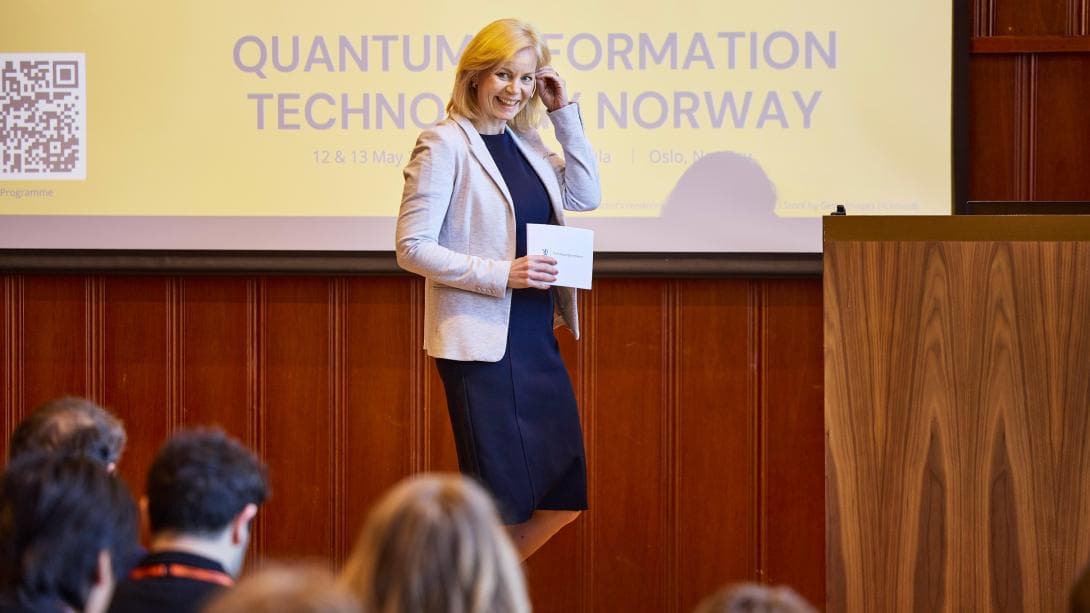
QIT Norway 2025 and the national quantum strategy
Published:
Simula Research Laboratory recently hosted the QIT Norway 2025 workshop on May 12th and 13th for an event with researchers, policymakers, and industry leaders presenting and discussing the future of quantum technologies in Norway.
QIT Norway was organised by Simula Research Laboratory, OsloMet – Oslo Metropolitan University, and Sigma2 AS, in collaboration with Digital Norway and co-funded by the Research Council of Norway.
Norway’s national quantum strategy is taking shape
Day one of QIT Norway was marked by presentations and discussions on quantum sensing, quantum communication, and quantum computing. A central theme was also the synergy between AI and quantum technologies.
The keynote address by Sigrun G. Aasland, Minister of Research and Higher Education, unveiled the forthcoming Norwegian quantum strategy process targeted for 2026. The Minister affirmed the government's dedication to bolstering Norway's standing in the global quantum landscape, signalling a collaborative national effort.

In response, experts like Jørgen Ellegaard Andersen from the University of Southern Denmark emphasised the critical role of research in quantum software and algorithms, highlighting Norway's potential in this domain. Elsi-Mari Borrelli of Algorithmiq stressed that the true quantum race lies in making quantum computers useful, a victory she believes will be "won in software."
Focusing on education, industry, and security
The second day of the workshop had a panel debate on quantum education, moderated by Ina von Turow. The panel discussion dove into foundational pillars for national quantum capacity: education, industry, and security. Takeaways from this panel included the necessity for interdisciplinary training across quantum physics, computing, and AI, as well as the essential role of collaborative networks. The overarching message was clear: Norway must proactively develop talent in quantum technologies as a part of the global quantum landscape.

Industry leaders, from Quantinuum, IBM, Orca Computing, and D-Wave, among others, presented the latest advancements in quantum hardware, software, and real-world applications. The crucial topic of security was also addressed. Carlos Cid, Director at Simula UiB, highlighted the cryptographic challenge: "If you manage to build large enough quantum computers, you can implement algorithms that already exist, which make it possible to crack today's encryption."
Norway's potential in quantum software
The event underscored Norway's unique position to take a leading role, particularly in quantum software. Researchers at Simula believe that Norway possesses a strong foundation. Professor Carlos Cid of Simula emphasised, "If we build education and an ecosystem, innovation will come." Norway has strong traditions in software development, algorithms, and security, areas that should be prioritised for growth in the national strategy.
Are Magnus Bruaset, Division Director at Simula ,stressed the importance of a holistic approach, that a national strategy should embrace broadly and include all three main areas: quantum sensors, quantum communication, and quantum processing, and that they must be seen in context. Bruaset asserted, "You have to look at the entire value chain to be effective."
Shaukat Ali, Chief Researcher at Simula, elaborated on the paradigm shift required, noting, "Quantum computers are completely different from classical machines. Everything we know about programming must be rethought." Ali believes Norway can build on its pioneering legacy in object-oriented programming, which originated with Simula in the 1960s, to lead globally in developing new programming languages and abstractions for quantum computing.
The QIT Norway 2025 workshop served as a valuable opportunity for interdisciplinary discussion and collaboration, reinforcing that Norway seems well-positioned to harness its quantum potential.
Image credit: Bård Gudim and Simula